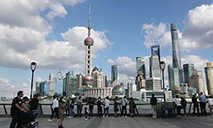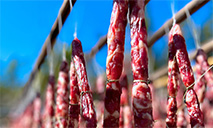Pandemic entering "new phase," yet too early to drop guard: WHO
COPENHAGEN, Jan. 24 (Xinhua) -- Two years after the COVID-19 pandemic in Europe and central Asia, the World Health Organization (WHO) has said the region could be "entering a new phase in the pandemic with plausible hope for stabilization."
"The pandemic is far from over, but I am hopeful we can end the emergency phase in 2022 and address other health threats that urgently require our attention," WHO Regional Director for Europe Hans Kluge said in a statement on Monday.
Nevertheless, he warned in the statement that "it is far too early to relax" because new COVID-19 variants are almost certain to emerge.
"With the millions of infections occurring in the world in recent and coming weeks, coupled with waning immunity and winter seasonality, it is almost a given that new COVID-19 variants will emerge and return," he said.
The WHO official elaborated by noting the challenges variants have caused, such as "the highly transmissible Omicron variant sweeping the region, from west to east."
"Omicron is displacing Delta with unprecedented speed. Less than two months since it was first discovered in South Africa, it now accounts for 31.8 percent of cases across the European Region, up from 15 percent the previous week, and 6.3 percent the week before that."
While the Omicron variant "appears to cause much less severe disease than Delta," Kluge said that the region is "still seeing a rapid rise in hospitalizations due to the sheer number of infections," noting that most people needing intensive care across the region, as predicted, are unvaccinated.
"The unacceptable human cost we know: every single hour since the pandemic's onset, 99 people in the Region have lost their lives to COVID-19. We mourn the more than 1.7 million people in the European Region who are no longer with us," he said.
Although more than 1.4 billion vaccine doses have been administered in the region, Kluge said "huge disparities in access to vaccines remain."
"If 2021 was the year of vaccine production, 2022 must be the year of vaccine equity in the European region and beyond. Too many people who need the vaccine remain unvaccinated. This is helping to drive transmission, prolonging the pandemic and increasing the likelihood of new variants," he said.
Photos
Related Stories
- China's small and medium firms evolve to seek vitality amid pandemic
- U.S. ways to tackle COVID-19 ignite domestic criticism, probes
- Nearly 2.97 bln COVID-19 vaccine doses administered on Chinese mainland
- Beijing takes swift, targeted measures to curb latest COVID-19 resurgence
- China's Xi'an clears high, medium-risk areas for COVID-19
Copyright © 2022 People's Daily Online. All Rights Reserved.










